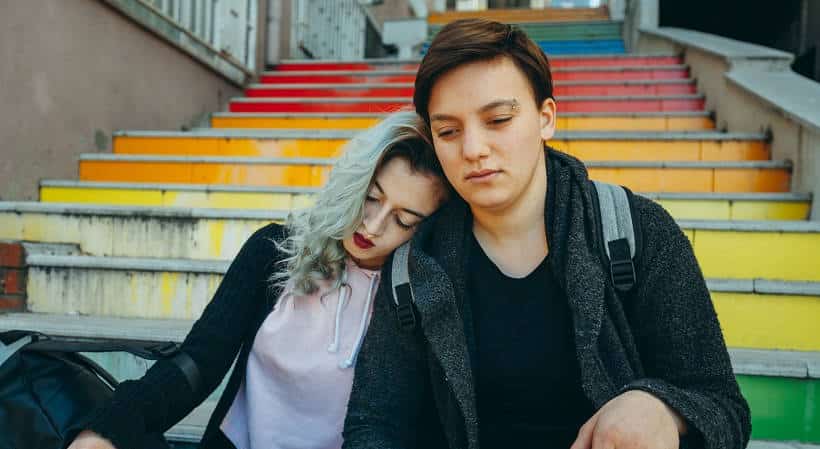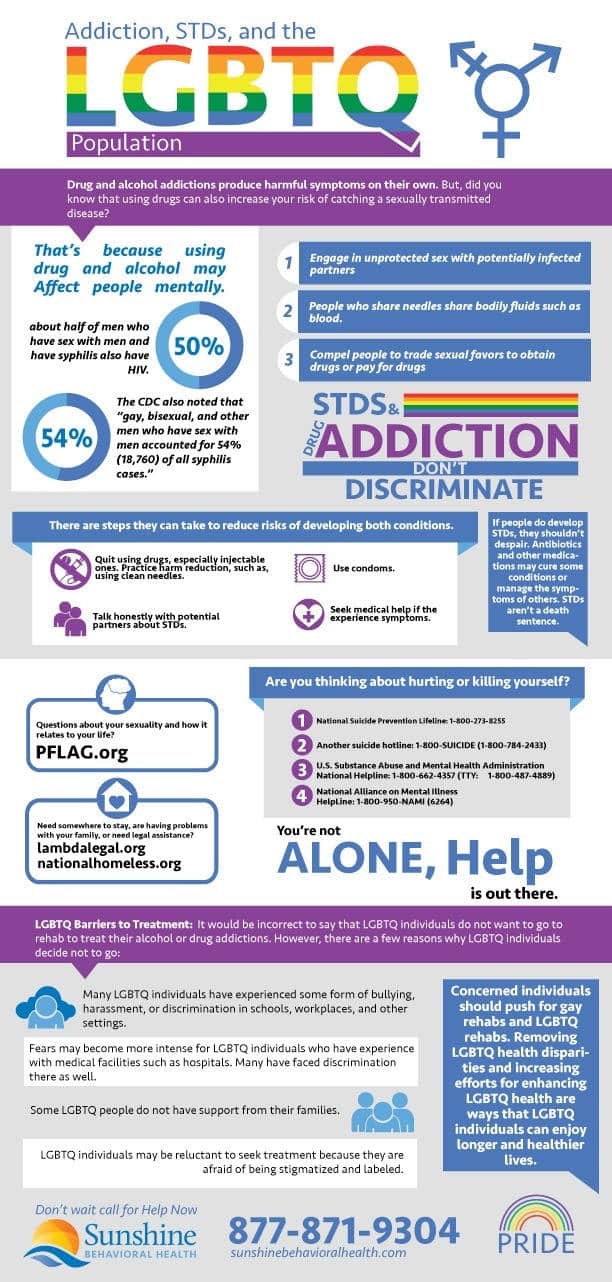Separate studies show that LGBTQ individuals have a higher likelihood of becoming alcohol and drug abusers and addicts.
A 2013 study published by the Centers for Disease Control and Prevention found that more LGBTQ adults between the ages of 18 and 64 years, admitted to being involved in instances where they had five or more drinks in a single occasion (binge drinking) compared to heterosexual adults.
Findings from a separate survey conducted by the National Survey on Drug Use and Health in 2015 revealed that 39.1% of adults who defined themselves as lesbians, gays, or bisexuals admitted to having used illegal drugs in that year. This was more than double the 17.1% of heterosexual adults who also admitted to using illicit drugs in the same period.
Another study saw that 30.7 percent or almost one-third of these lesbian, male or female gay, or bisexual adults admitted to having used marijuana in the year preceding the survey. Again, this is more than double the 12.9 percent of straight adults who used marijuana in the same 12-month period. And still, another study revealed that 10.4 percent of lesbian, gay, transgender or bisexual adults misused prescription pain medication, compared to 4.5 percent of heterosexual adults who also misused prescription pain relievers.
One probable reason for this is that LGBTQ individuals are frequent victims of discrimination and similar social stigma that are not encountered by heterosexuals. More than this, LGBTQ individuals are also more vulnerable to harassment and even violence.
Some gay and bisexual men, also use alcohol and illicit drugs, such as methamphetamines, and amyl nitrates to treat erectile dysfunction.
Addiction, STDs, and the LBGTQ Population
Drug and alcohol addictions produce harmful symptoms on their own. But, did you know that using drugs can also increase your risk of catching a sexually transmitted disease (STD) or sexually transmitted infection (STI) such as gonorrhea, chlamydia, syphilis, herpes, HIV/AIDS, HPV (human papillomavirus), or trichomoniasis (trich)?
That’s because using drug and alcohol may
- Affect people mentally. They may feel that nothing can hurt them, so they engage in unprotected sex with potentially infected partners without considering the consequences.
- Require needles to inject the substances. People who share needles share bodily fluids such as blood. The fluids may transmit conditions such as syphilis from one person to the next.
- Compel people to trade sexual favors to obtain drugs or pay for drugs, which exposes people to more partners and more bodily fluids (such as semen, vaginal fluids, saliva, and urine) that may spread more infections.
Members of the LGBTQ population may be more vulnerable to STDs. According to 2018 estimates by the Centers for Disease Control and Prevention (CDC), about half of men who have sex with men and have syphilis also have HIV. The CDC also noted that “gay, bisexual, and other men who have sex with men accounted for 54% (18,760) of all syphilis cases.”
STDs and drug addiction don’t discriminate, though. All people are vulnerable, but there are steps they can take to reduce risks of developing both conditions. They can
- Quit using drugs, especially injectable ones.
- Practice harm reduction. That could mean using clean needles each time they use drugs and not sharing needles with anyone.
- Use condoms to reduce the chances of contracting STDs or spreading them to anyone else.
- Talk honestly with potential partners about STDs before intercourse.
- Seek medical help if they experience symptoms or visit providers to receive regular health screenings.
If people do develop STDs, they shouldn’t despair. Antibiotics and other medications may cure some conditions or manage the symptoms of others. STDs aren’t a death sentence. They shouldn’t prevent people from living life. Similarly, identifying and treating addiction early can help prevent people from developing from STDs and other conditions or help restore their lives If you’re struggling with drug or alcohol addiction or other problems, remember that you’re not alone. There’s a good chance that other people have had or are having similar struggles. There’s also a good chance that there are people and organizations who can help you solve your problems.
Help for the LGBTQ Population
Are you addicted to drugs or alcohol?
Do you have questions about your sexuality and how it relates to your life?
Do you need somewhere to stay, are having problems with your family, or need legal assistance?
Do you have HIV, AIDS, or other health concerns?
Are you thinking about hurting or killing yourself?
LGBTQ Barriers to Treatment
It would be incorrect to say that LGBTQ individuals do not want to go to rehab to be treated for their alcohol or drug addictions. However, there are a few reasons why LGBTQ individuals decide not to go:
- Many LGBTQ individuals have experienced some form of bullying, harassment, or discrimination in schools, workplaces, or other settings. Understandably, they fear that this could happen in rehab facilities where movement is restricted, and when the people in charge and the people being treated are strangers.
- Fears may become more intense for LGBTQ individuals who have experience with medical facilities such as hospitals. Many have experienced discrimination there as well. This is a different category because people often have different expectations of care and consideration from medical personnel. Sadly, a prime reason for inadequate and insensitive treatment comes from a lack of training. Studies show that formal training decreases prejudice and increases competence in caring for minority groups.
- Some LGBTQ people do not have support from their families. This is not a concern that is restricted to LGBTQ individuals, of course, but as marginalized people, family support is especially important to help LGBTQ people heal and thrive.
- Heterosexual people and LGBTQ individuals often receive treatment together but may have different needs. LGBTQ individuals often have different experiences when it comes to addiction, even from the reasons why they first tried drugs or alcohol. It may take too much precious time and effort to explain themselves and their situations every time.
- Treatment facilities do not come cheap. Again, this experience is not unique to LGBTQ individuals. But, since LGBTQ individuals are part of a marginalized group, access to employment and financial assistance may be more difficult, making it harder to finance treatment and take care of other needs.
- In theory, LGBTQ individuals should be able to seek assistance from government institutions. But, governments may not even know of their existence. There may not be an accurate count of the number of LGBTQ individuals because there are not enough questions about them in national surveys, if there are any questions at all.
- Like other people, LGBTQ individuals may be reluctant to seek treatment because they are afraid of being stigmatized and labeled. They may worry that others will call them junkies or discriminate against them because they abused drugs or alcohol or sought treatment to end such abuse.
Concerned individuals should push for gay rehabs and LGBTQ rehabs. Removing LGBTQ health disparities and increasing efforts for enhancing LGBTQ health are the only ways that LGBTQ individuals can enjoy longer and healthier lives.
Unique Treatments at LGBTQ Rehab
When you’re seeking a LGBTQ rehab , there are several treatment options available. Among them are the following:
- LGBTQ 12-Step Program – The 12 step drug rehab program is one of the most widely used by the best rehab centers due to their popularity and proven success. The 12 steps have been around for nearly 100 years now and most people can often find a personal story of how somebody was able to get sober through 12 step groups. It is important that groups are either LGBTQ or LGBTQ Allies.
- LGBTQ Non-12-Step Program – Non 12 step rehab treatment facilities are best known for offering scientific-based alternative techniques for treatment. If you are keen on trying non 12 step rehab treatment, make sure to look around for various alcohol and drug rehab treatment facilities to compare the types of non 12 step rehab treatment they offer. You must also pick a treatment facility that works with the LGBTQ groups.
- LGBTQ Holistic Approach – Focusing on the mind, body, and spirit is what the holistic approach to drug and alcohol addiction treatment is about. It gives primary concern on treating the whole person specifically on the interconnection of the mind, body, and spirit. This method may be used in conjunction with other approaches.
- LGBTQ Dual Diagnosis – Facilities that use dual diagnosis approach sees the need to treat symptoms of mental health disorder together with the addiction. This is to provide an individual with the treatment that they actually need. Instead of treating the conditions separately, they are nursed as part of a continuum. Psychotherapeutic medications are administered like anti-anxiety medicines. It builds the patient’s self-confidence and reinforces their self-esteem rather than confront them in a negative manner.

Are you or your loved suffering from addiction?
Speak to one of our intake representatives
What to Expect at LGBTQ Rehab
Each LGBTQ rehab facility will have its own style of conducting its treatment program. At the same time, the treatment should follow the same effective general methodology. First, LGBTQ rehab will start by looking into your medical history. These will include the types of illicit or prescription drugs you have used or the number of years that you have used drugs or alcohol. They will also ask about the circumstances surrounding the first time you started drinking alcohol or doing drugs, the company that you keep during these times, and the situation that triggers your need for these substances.
Information gathered here will help in formulating your personalized LGBTQ rehab treatment plan. Next, comes detoxification or removing the drugs or alcohol present in your system. At the same time, you will receive assistance in coping with the accompanying withdrawal symptoms that detoxification will bring.
After an LGBTQ individual has made the powerful decision to quit, a difficult time awaits them. Withdrawal is the body’s reaction to being suddenly deprived of the addictive substance it is used to having. There are many available guides if you want to do this at home. However, this usually involves self-soothing, primarily meditation, and yoga. Self-soothing methods are also available to LGBTQ rehab. However, medication is also used to ease pain and discomfort. With alcohol addiction, it is also best to have trained personnel assist in tapering off because a sudden withdrawal could lead to severely negative effects and can be fatal.
And as your symptoms dissipate, you can start with different kinds of individual and group therapy with the other patients, and later on maybe with your family or friends to dig even deeper into the underlying cause of your substance addiction. And as the days go by and you find yourself more lucid, you will be introduced to techniques that will help to prevent a relapse. This is very important in an LGBTQ rehab. You will need to graduate with a stronger resolve to turn your back on your addiction.
And finally, an aftercare program will be designed for you. This will take into account your chances for a relapse, based on the preliminary interview and the information from your therapy sessions.
Paying for LGBTQ Rehab
This is another issue that prevents any patient from enrolling in a gay rehab or LGBTQ rehab. However, there are options. One is to pay for LGBTQ rehab out of your own savings or your family’s money. This can be done outright in cash with additional savings or it can be done in affordable installment terms.
You can also have your insurance pay for LGBTQ rehab. Or at least a portion of it while you pay for the rest. Under the Affordable Care Act, health insurance providers are required to include alcohol and drug treatment recovery treatment in their required coverage. You may also be eligible for public insurance, such as Medicaid.
You can inquire if your local government has special programs that will cover LGBTQ rehab. You can enroll in rehab scholarships. There are a handful of groups that pay for drug and alcohol rehab for those who cannot afford it. With the increasing prominence of LGBTQ issues, it is likely that there will be many foundations and NGOs who will be more LGBTQ-oriented when it comes to rehab scholarships.
Medical disclaimer:
Sunshine Behavioral Health strives to help people who are facing substance abuse, addiction, mental health disorders, or a combination of these conditions. It does this by providing compassionate care and evidence-based content that addresses health, treatment, and recovery.
Licensed medical professionals review material we publish on our site. The material is not a substitute for qualified medical diagnoses, treatment, or advice. It should not be used to replace the suggestions of your personal physician or other health care professionals.








